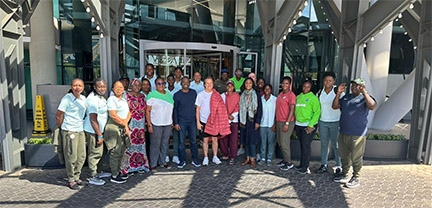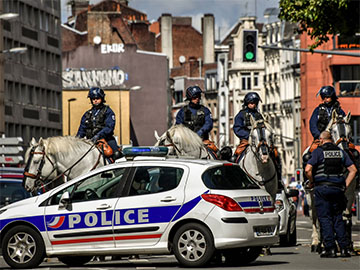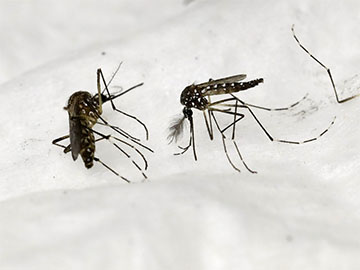Olympics
Paris-bound Super Falcons return, commend Nigeria’s Charge d’Affaires Ajayi

Nigeria’s triumphant delegation to South Africa for Tuesday’s Women’s Olympic Football Tournament final qualifying game flew back to the country on Wednesday night, with words of praise for Nigeria’s Charge d’Affaires at the Nigeria High Commission in Pretoria, Alexander Tope Ajayi.
With a 1-0 win over the Banyana Banyana in Abuja on Friday last week, The Pride of Africa dug their feet into the ground to grind a favourable scoreless draw that qualified Nigeria to the Women’s Olympic Football Tournament for the first time in 16 years.
While most of the players and Coach Randy Waldrum left for their different bases direct from Johannesburg, eight players and the other team officials flew back to Lagos on Wednesday night aboard a South African Airways flight.
NFF’s Director of Competitions, Ruth David told thenff.com that South African Football Association authorities abandoned the Super Falcons immediately after Tunisian referee Dorsaf Ganouati’s final whistle confirmed that Nigeria, and not South Africa, would be joining Brazil, Spain and Japan in Group C of this year’s Olympic Tournament.
“SAFA officials made it clear that we were thenceforth on our own. They said the bus would not move us to anywhere again, that their responsibilities ended with the final whistle. They only took us back to the hotel, and no longer detailed security personnel for the delegation.
“We must commend the Charge d’Affaires in the Nigerian High Commission in Pretoria, Mr. Alexander Tope Ajayi for all his efforts. He made the team feel comfortable and at home right from our arrival, organized dinner for the team and mobilized and provided transport for Nigerians based in Pretoria to come to the stadium and support the team. He also organized transport and saw the team off to the airport on departure.”
Captain Rasheedat Ajibade’s well-taken penalty separated the two leading African women teams over both legs and sent the Falcons to France, while the Banyana will miss a third Olympics after their only previous appearance in London 12 years ago.
Olympics
Computers stolen from the French Olympics’ organiser

Two computers belonging to “a manager in charge of planning for the Lille Olympic site” were stolen from a car parked in the city on Tuesday the prosecutor’s office has reported.
The robbery took place on Monday at approximately 18:30 CEST, though access to files stored on the networks of the computers and in the cloud were blocked by the Paris 2024 IT department.
Lille prosecutor Carole Etienne, was quick to address the situation saying, “The complaint from a manager responsible for the planning of the Lille Olympic site was received on the evening of 29 April regarding the theft of two laptops and a badge which were in the organiser’s vehicle, which was parked in front of their home.”
“Investigations are underway” to identify the suspect and determine “the exact nature of the data that these computers contained in connection with the 2024 Olympics,” she added. As per a police source, it is probable that one of the stolen computers contained “security plans” for the infrastructure of the Olympic village located in Villeneuve-d’Ascq, Lille.
“In accordance with Paris 2024 procedures, all data recorded on Paris 2024 computer equipment is encrypted and protected by passwords, and as soon as the theft was reported, the computer was locked remotely,” a spokesperson from the Olympics’ Organising Committee (Cojo) said.
“The security of computer equipment is one of the priorities of Paris 2024, which has taken all risks into account in order to deal with any incident,” the Committee added.
The alleged incident happened after a briefcase was stolen containing notes and sensitive information about the Olympic Games from an engineer at Paris City Hall. A 23-year-old man has since been arrested and sentenced to seven months in prison. Such a crime raised concerns when a police source said the briefcase contained a computer and two USB sticks with security plans for the Paris Olympics.
Days later, however, the Paris prosecutor’s office said the USB drive “contained only notes on road traffic in Paris during the Olympic Games and no sensitive security information”. The judicial source mentioned that the suspect was “known” to the police for multiple thefts on public transport, notably in early January.
Additionally, apart from being a recurrent theft offender, the accused was charged with declining to provide his phone code to the authorities.
-insidethegames
Olympics
Zambia’s women could be barred from football at Olympics

Zambia’s women could miss out on playing at this summer’s Olympics after FIFA threatened the country’s football association with suspension amid accusations of money-laundering offences against its president, Andrew Kamanga.
FIFA considers the action as “undue influence by third parties”.
Andrew Kamanga, the FAZ president since 2016, was last week charged by Zambia’s drug enforcement commission with obtaining government funds under false pretences and being part of a conspiracy to defraud.
It was alleged that he used the money to fund trips for two associates to the Africa Cup of Nations in Cote d’Ivoire earlier this year.
The general secretary, Reuben Kamanga, was also charged, along with Madalitso Kamanga and Jairous Siame, who travelled to the tournament as part of Football Association of Zambia’s support staff. All have denied the charges.
Zambia’s women’s team qualified for the Olympics last month after beating Morocco 3-2 on aggregate.
They are still coached by Bruce Mwape, who is believed to remain under investigation by FIFA after allegations of misconduct before and during the Women’s World Cup last year that were first made in the UK newspaper, the Guardian. He has denied the claims.
Olympics
Mosquito-induced viral infection spreads in France ahead of Olympics

France has reportedly registered a record number of imported cases of dengue – a break-bone fever which is a viral infection that spreads from mosquitoes to people.
This is happening just three months to the commencement of the Paris 2024. The alarm has been raised by the French health authorities.
According to the reports, there have been 1,700 cases across France since January.
The Director General of Health, Gregory Emery, was quick to issue the stark warning at a press conference.
He said: “Since January 1, 2024, 1,679 cases of dengue have been imported into metropolitan France, against 131 during the same period in 2023.”
These cases correspond to people who travelled to regions of the world, such as the French Antilles, where the virus is transmitted by mosquitoes of the Aedes albopictus species.
“It is a reflection of what is happening in the Antilles and, more broadly, in Latin America and the Caribbean, where dengue has been circulating since the beginning of the year at unprecedented levels,” said the head of Sante Publique France, Caroline Semaille.
Even before the Olympic Games, France broke the record for imported dengue cases in the metropolitan area (2,019) at the mercy of a greater influx of people in the capital.
According to the European Centre for Disease Prevention and Control, the majority of these cases originate from Guadeloupe and Martinique, where an ongoing “epidemic” is observed. Additionally, French Guiana has reported 7,000 confirmed dengue cases since the start of 2024.
Health authorities have called on people to “remain vigilant and adopt good gestures to limit the proliferation of the tiger mosquito”, such as, for example, eliminating stagnant water and avoiding being bitten. With 3.5 million cases so far this year, Latin America and the Caribbean will probably experience their “worst dengue season”, caused by climate change, the Pan American Health Organisation (PAHO) warned at the end of March.
Experts blame climate change for the mosquitoes’ ability to adapt easily to colder climates, and authorities recently declared Normandy in the northwest, the last remaining mosquito-free region in France, as infested as the rest of the country.
Dengue, also known as break-bone fever, is a viral infection that spreads from mosquitoes to people. It is more common in tropical and subtropical climates. Most people who get dengue will not have symptoms. However, for those who do, the most common symptoms are high fever, headache, body aches, nausea, and rash.
-

 Boxing3 days ago
Boxing3 days agoNigeria sports minister set for ’bout’ with Bash Ali
-

 CAF Confederation Cup1 week ago
CAF Confederation Cup1 week agoNigeria’s Samson Adamu signs Algeria’s USM match forfeiture
-

 Nigerian Football1 day ago
Nigerian Football1 day agoNFF cuts Enyimba’ point haul by two
-

 Nigerian Football2 days ago
Nigerian Football2 days agoFinidi George becomes Nigeria’s 41st national coach
-

 CAF Confederation Cup1 week ago
CAF Confederation Cup1 week agoBREAKING! CAF awards abandoned Confederation Cup semi-finals to Morocco’s RS Berkane
-

 Nigerian Football5 days ago
Nigerian Football5 days agoRemo Stars close to winning their first Nigeria Premier League title
-

 African Games1 week ago
African Games1 week agoBREAKING! Accra 2023 African Games Chieftain is dead
-

 Premier League1 week ago
Premier League1 week agoFive-Star Arsenal hammer Chelsea to move three points clear at the top













